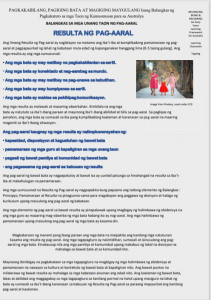23 Tagalog translation of the Early Years Learning Framework
Deirdre Byrne
To address the educators’ concern this resource consists of a Tagalog translation (Central Philippine language) of page twenty two, Learning Outcomes, from Belonging, Being and Becoming: The Early Years Learning Framework for Australia document (DEEWR, 2009).

Rationale
With an increasing globalisation of populations, there is a growing number of families that have English as an additional Language or dialect (EAL/D) who are accessing the early childhood sector. It is a requirement of the National Quality Framework (NQF) that educators and services attend to diversity as a matter of principle, policy and action (ACECQA, 2020c). This resource meets the key concern of educators of having available a prepared, translated section of a key guiding document to give to families. This supports a family’s sense of belonging by valuing their interest in their child’s educational journey and providing an opportunity to be better informed of how the learning outcomes are used to support children. It also provides access to important content contained within guiding documents and frameworks that govern early learning centres. This document supports educators in their requirement to effectively interact with different cultures as a way forward to cultural competency and intercultural understanding (Choi et al., 2012; Department of Education, Employment and Workplace Relations [DEEWR], 2009).
This resource consists of a Tagalog translation of page twenty two, Learning Outcomes, from the Belonging, Being and Becoming: The Early Years Learning Framework for Australia (EYLF) document (DEEWR, 2009). This page is significant in that it highlights the 5 learning outcomes upon which the ELYF is founded and informs parents of the broad and observable outcomes that are applied to learning in the early years, recognising the different ways children learn (Grieshaber, 2010). The page explains to parents how educators used these outcomes as part of a holistic, strengths based, life-long approach to learning and development, including high expectations for all children to succeed (Grieshaber, 2010), which are important to Filipino culture (Omaga & Alieto, 2019). The document also supports parents to understand the ELYF’s commitment to families and community and that practices are culturally and contextually appropriate (DEEWR, 2009).
This document can be given to families upon enrolment, attached to newsletters or social media, or at any time when educators wish to inform parents of how the learning outcomes benefit children. It complements the current Tagalog translation of the Belonging, Being and Becoming – An Early Years Learning Framework for Australia – Information for Families (Tagalog) brochure that can be found at https://docs.education.gov.au/documents/belonging-being-becoming-early-years-learning-framework-australia-information-families-16. By providing this translation, educational services are respecting and supporting the role of families in their child’s learning (ACECQA, 2020c).
Other useful Tagalog translated resources for educators
• Introduction to transition information sheet and accompanying letter to families from: https://www.education.vic.gov.au/childhood/professionals/learning/Pages/family.aspx
• A range of books, audio visual and resources available in Tagalog or Tagalog/English can be found by searching the Trove website at https://trove.nla.gov.au/result?q=tagalog
• Tagalog Flash cards for Kids https://trove.nla.gov.au/work/214987246?q=tagalog&c=picture&versionId=236009036
Resource Links to National Quality Standard
Quality Area 6 – Collaborative partnerships with families and communities
Standard 6.1 Supportive relationships with families
Element 6.1.3 – Families are supported
• Current information is available to families about the service and relevant community services and resources to support parenting and family wellbeing.
Standard 6.2 Collaborative partnerships
Element 6.2.1- Transitions
• Continuity of learning and transitions for each child are supported by sharing information and clarifying responsibilities.

